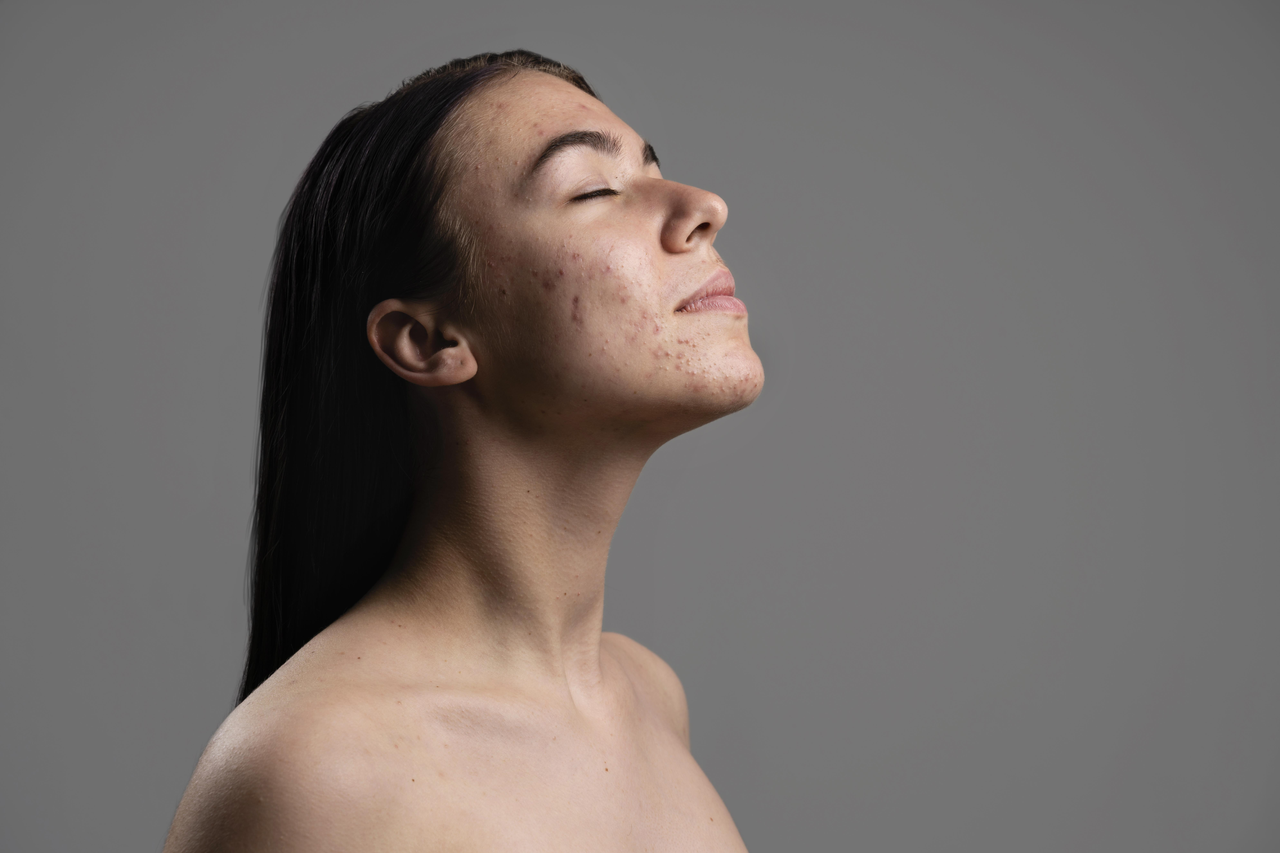Dark spots, whether they're the aftermath of acne, sun exposure, or simply signs of aging, can be frustratingly stubborn. Despite our best efforts and investment in various skincare products, these seemingly persistent blemishes often refuse to budge, leaving us wondering why our skin won't cooperate.
Understanding the common reasons behind the resilience of dark spots is essential for anyone striving for clearer, more radiant skin. Beyond just their appearance, dark spots can really impact how we feel about ourselves, affecting our confidence and self-esteem. This often leads us to try everything we can to get rid of them.

In this article, we're going to dig into the details of dark spots and how they affect the way our skin looks. We'll explore why these stubborn marks stick around even when we're doing our best to make them disappear. Whether it's not protecting our skin enough from the sun or dealing with underlying skin issues, each of these factors is a key piece of the puzzle when it comes to understanding why dark spots just won't fade away.
1. Lack of Sun Protection
Excessive exposure to ultraviolet (UV) radiation from the sun is a primary culprit behind the development and worsening of dark spots. UV rays stimulate the production of melanin, the pigment responsible for skin coloration, leading to hyperpigmentation and the formation of dark spots. Even existing dark spots can become darker and more pronounced when exposed to sunlight without adequate protection.
Related Article
The Vital Role of Consistent Sun Protection:
Consistent and effective sun protection is paramount in the treatment and prevention of dark spots. By shielding your skin from harmful UV rays, you not only prevent the formation of new dark spots but also safeguard existing ones from further darkening. Incorporating sun protection into your daily skincare routine is crucial, regardless of the weather or the season.

Tips for Optimal Sunscreen Use:
-
Choose Broad-Spectrum Sunscreen: Opt for a broad-spectrum sunscreen that protects against both UVA and UVB rays.
-
Use SPF 30 or Higher: Select a sunscreen with a Sun Protection Factor (SPF) of 30 or higher to ensure adequate protection against UV radiation.
-
Apply Generously and Reapply: Apply sunscreen generously to all exposed areas of skin at least 15 minutes before sun exposure. Reapply every two hours, or more frequently if swimming or sweating.
-
Cover All Exposed Skin: Don't forget commonly overlooked areas like the ears, neck, hands, and feet.
-
Seek Shade and Wear Protective Clothing: Whenever possible, seek shade during peak sun hours, typically between 10 a.m. and 4 p.m. Wear protective clothing, such as wide-brimmed hats, long sleeves, and sunglasses, for added sun protection.
By prioritizing sun protection and incorporating these tips into your daily routine, you can significantly reduce the risk of exacerbating dark spots and promote healthier, more even-toned skin.
2. Inconsistent Skincare Routine
Consistency is key when it comes to treating dark spots effectively. A regular skincare routine not only helps to fade existing dark spots but also prevents the formation of new ones. By sticking to a consistent regimen, you provide your skin with the necessary ingredients and treatments to target hyperpigmentation and promote overall skin health.
Common Mistakes in Skincare Routines:
-
Skipping Steps: Many people overlook essential steps in their skincare routine, such as cleansing, moisturizing, and applying treatment products.
-
Using Harsh Products: Overuse of harsh or abrasive products can irritate the skin and exacerbate dark spots.
-
Over-Exfoliation: Excessive exfoliation can strip the skin of its natural oils and cause irritation, leading to inflammation and increased pigmentation.
Recommendations for Establishing a Consistent Regimen:
-
Simplify Your Routine: Focus on the essentials – cleanse, treat, moisturize, and protect.
-
Choose Gentle Products: Opt for gentle, non-abrasive skincare products formulated for your skin type.
-
Stick to a Schedule: Establish a daily skincare routine and stick to it, even on days when you're tired or busy.
-
Track Your Progress: Keep track of your skincare routine and any changes in your skin's appearance to identify what works best for you.
-
Be Patient: Consistency is key, but results take time. Stick with your routine and be patient as you work towards fading dark spots and achieving clearer, more radiant skin.

3. Using Ineffective Products
To effectively treat dark spots, it's crucial to use products containing ingredients that have been proven to target hyperpigmentation. Some key ingredients include:
-
Retinoids: These vitamin A derivatives work to increase cell turnover, fading dark spots and promoting skin renewal.
Related Article:
-
Vitamin C: A potent antioxidant, vitamin C helps to brighten the skin and fade dark spots by inhibiting melanin production.
-
Niacinamide: Also known as vitamin B3, niacinamide helps to reduce inflammation, regulate sebum production, and minimize the appearance of dark spots.
-
Alpha hydroxy acids (AHAs): AHAs like glycolic acid and lactic acid exfoliate the skin, removing dead skin cells and promoting the fading of dark spots.
Warning Against Ineffective Products:
Not all skincare products are created equal, and using ineffective products can not only waste time and money but also potentially worsen dark spots. Beware of products that make lofty claims without scientific evidence to back them up. Additionally, avoid products containing potentially harmful ingredients like hydroquinone, which can cause irritation and other side effects if used incorrectly.
Guidance on Selecting Effective Products:
When choosing products for dark spot treatment, look for those containing the aforementioned key ingredients known for their efficacy. Pay attention to the concentration of active ingredients, as higher concentrations may be more effective but also more likely to cause irritation, especially for those with sensitive skin. It's also essential to patch-test new products before applying them to your face to avoid adverse reactions.
By selecting products containing proven effective ingredients and avoiding those with inadequate or potentially harmful ingredients, you can optimize your dark spot treatment regimen for better results and minimize the risk of irritation or other side effects.
4. Underlying Skin Conditions
Sometimes, other skin problems can make dark spots even darker or cause new ones to appear. For example, conditions like acne can leave behind dark spots after pimples go away. Similarly, if you have eczema and scratch your skin a lot, it can lead to dark spots where you've been scratching. Hormonal changes, like those during pregnancy or due to certain medications, can also cause dark patches on your skin called melasma.

Examples of Common Skin Issues:
-
Acne: When you have acne, the redness and swelling can leave behind dark spots once the acne clears up. These spots can stick around for a while.
-
Eczema: Eczema is a skin condition that makes your skin red, itchy, and sometimes bumpy. If you scratch your eczema a lot, it can cause dark spots to appear where you've been scratching.
-
Hormonal Changes: Sometimes, changes in your hormones can cause dark patches on your skin, especially on your face, called melasma. This often happens during pregnancy or when taking certain medications.
Why Treating the Root Problem Matters:
It's important to not just treat the dark spots but also to deal with the underlying skin issues. If you only treat the dark spots without fixing what's causing them, they might come back later on. By taking care of the main problem, whether it's acne, eczema, or hormonal changes, you can stop new dark spots from forming and keep your skin looking its best for the long term.
5. Expecting Overnight Results
It's important to realize that fading dark spots takes time and patience. Unlike some skincare issues that show immediate results, like moisturizing dry skin, dark spots often require weeks or even months of consistent treatment to see significant improvement. This is because the process of reducing pigmentation and promoting skin renewal occurs gradually.
Managing Expectations:
It's easy to feel discouraged when dark spots don't disappear overnight, but it's essential to manage our expectations realistically. Dark spot treatments work by gradually lightening the pigmented areas and promoting the turnover of skin cells.

While you may start to notice some improvement after a few weeks of consistent use, significant results typically take longer to achieve. Understanding and accepting this gradual process can help you stay motivated and committed to your treatment routine.
Patience is truly a virtue when it comes to treating dark spots. It's crucial to stick with your chosen treatment approach and be consistent in your efforts, even when results may not be immediately apparent. Remember that skincare is a journey, and progress may not always be linear.
Celebrate small victories along the way, such as a slight reduction in the intensity of dark spots or an overall improvement in skin texture. By staying patient and consistent, you'll be rewarded with clearer, more even-toned skin over time.
Key Takeaways
Achieving clearer, more radiant skin free from dark spots is a journey that requires dedication, patience, and a realistic understanding of the factors influencing our skin's appearance. While dark spots can be stubborn and frustrating, they are not insurmountable obstacles.
By addressing common culprits such as inadequate sun protection, inconsistent skincare routines, using ineffective products, and underlying skin conditions, we can take proactive steps towards fading dark spots and promoting overall skin health.

It is essential to approach dark spot treatment with a mindset of long-term commitment rather than seeking instant gratification. Results may not come overnight, but with perseverance and a well-rounded skincare approach, progress is achievable. Remember to be gentle with your skin, listen to its needs, and seek professional guidance if needed.
Ultimately, embracing our skincare journey with patience and consistency can lead to not only clearer skin but also a renewed sense of confidence and self-assurance. Let's empower ourselves with knowledge, kindness towards our skin, and a steadfast commitment to achieving our skincare goals. Together, we can overcome the challenges posed by dark spots and embrace the beauty of our natural, radiant selves.
Looking for recommended skincare products that effectively deal with dark spots?
Check out these stores on Amazon:





